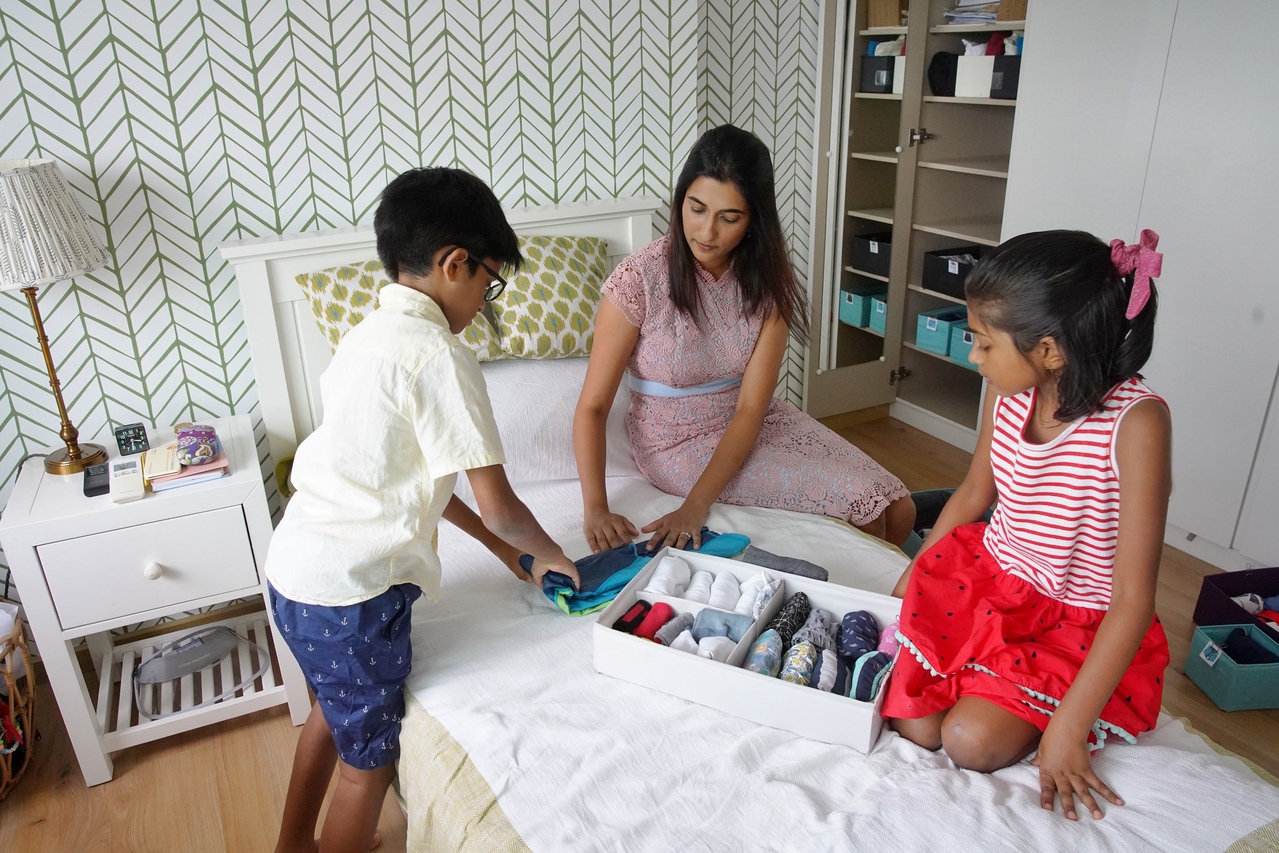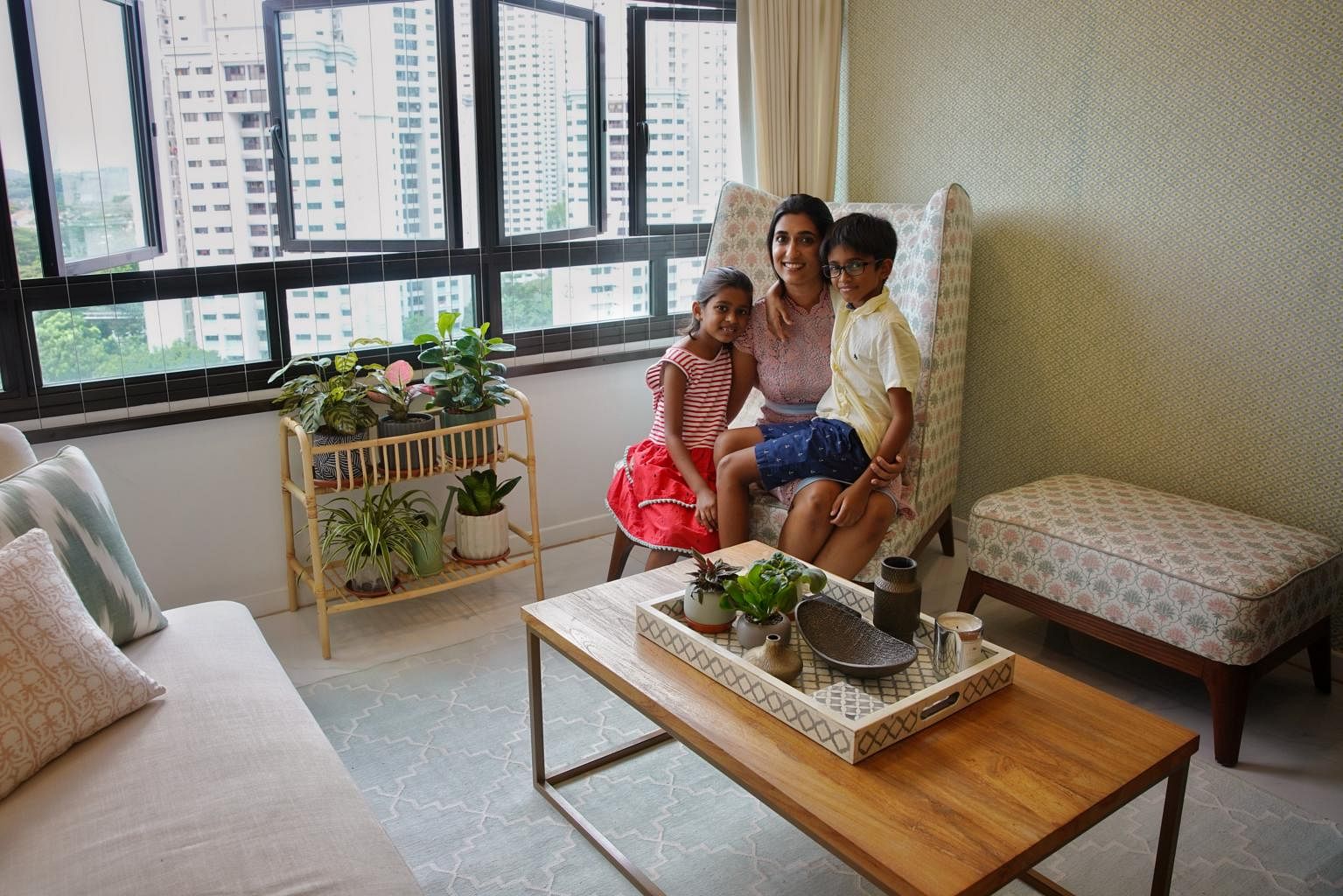Tidying takes off during Covid-19: Teaching kids by example
Sign up now: Get ST's newsletters delivered to your inbox

Certified KonMari consultant Aparna Chari Sundar with her children in their home.
ST PHOTO: JASON QUAH
SINGAPORE - Children's toys "exploding from every nook and cranny" are the tipping point for many clients seeking the help of certified KonMari consultant Aparna Chari Sundar.
Working from home while feeling unable to maintain a tidy household is a common sentiment, says Dr Sundar, 35, who went through medical school in India and once worked as a hospital administrator here.
The Singapore citizen, who was born and raised in Bangalore, says: "There's been a big need for tidying during the pandemic. People are opening cupboards and looking around their homes a lot more. Before, they probably didn't take notice of what was going on at home until the weekend."
Yet, for all the parental angst surrounding kids' belongings strewn across the home, she has noticed that parents are sometimes guilty of the same offence.
She has encountered "200 pairs of shoes", bomb shelters stuffed to the gills, and barely touched kitchen appliances.
"If the parent has not decluttered, there's a low chance the children will want to cooperate, and they may act up with tantrums and talk back," says Dr Sundar.
"We always start with the adult. Our spaces should be an example. Like any other parenting strategy, parents are the role models."
Combining the KonMari Method with a Montessori perspective - which emphasises focusing on what children need and fostering their independence - is a natural fit, she says, because children crave order and want to feel part of and contribute to their home.
"I've seen so many homes where the school uniforms are placed on a higher rod on the clothing rack, compared with the adults' clothes," says Dr Sundar.
One way to encourage young children to be more independent is by asking them to pack their snacks and water bottles and lay out their uniforms before school the next day.
Besides being a professional home organiser, Dr Sundar is a Montessori assistant certified by the Association Montessori Internationale. She took online courses to achieve both sets of accreditation last year. She offers consultancy services under her company, Global Mindful Journey, though she declines to reveal her fees.
Her daughter Alisha, seven, and son Aryan, nine, started helping around the house when they were each about four years old, by folding their socks according to KonMari techniques she taught them, arranging the socks vertically in a drawer for easier access.

Dr Sundar is married to a 37-year-old consultant in medical oncology at the National University Cancer Institute.
Decluttering is not about focusing on pretty containers and a Pinterest-perfect apartment, she says.
"Once you KonMari your home, once you have visual clutter out of the way, you start to have the mental space to think about things like whether the relationships around you are working out, and whether you are being honest and truthful about your passions," she says.
Stay-at-home mother Reema Mehta describes Dr Sundar's tidying services as "interior design for the inner parts of the home".
Decluttering these frequently used but less visible spaces - closets, storage areas and kids' drawers - "has a transformative feeling that affects every other aspect of life, whether it's how we raise our kids or my relationship with my husband", says Mrs Mehta.
"It can sound too good to be true. I'm aware of that. Somehow, the whole is much larger than the sum of its parts."

She and her husband, who runs his own technology start-up, are in their late 30s. They have three sons - an eight-year-old and twins who are five.
Dr Sundar guided Mrs Mehta in practising the KonMari tenet where everything - even sewing items or phone accessories - has its own "home".
Her eldest son, who once could not find his schoolbag at home, now has a designated space for his textbooks. Supervising his homework has thus become less fraught for Mrs Mehta, who would previously have to devote 20 minutes to finding and gathering the assessments he had to do.
She also used to not be able to find things easily because she did not know where she put them.
Finding her mascara took ages, leading to slight but simmering tensions on date nights with her husband, who waited longer than expected for her to put on her make-up and get ready.

A "clutter island" on her bedside table would also regularly coalesce following a spurt of tidying, comprising random items she picked up: freebies, documents, two tubs of skin cream.
The "island" has since disappeared.
"We've freed up a lot more family time," says Mrs Mehta.
Tidying tip
Moving out? KonMari your home first. You're not forcing your new home to fit your belongings. You design your home knowing what you are bringing over.


